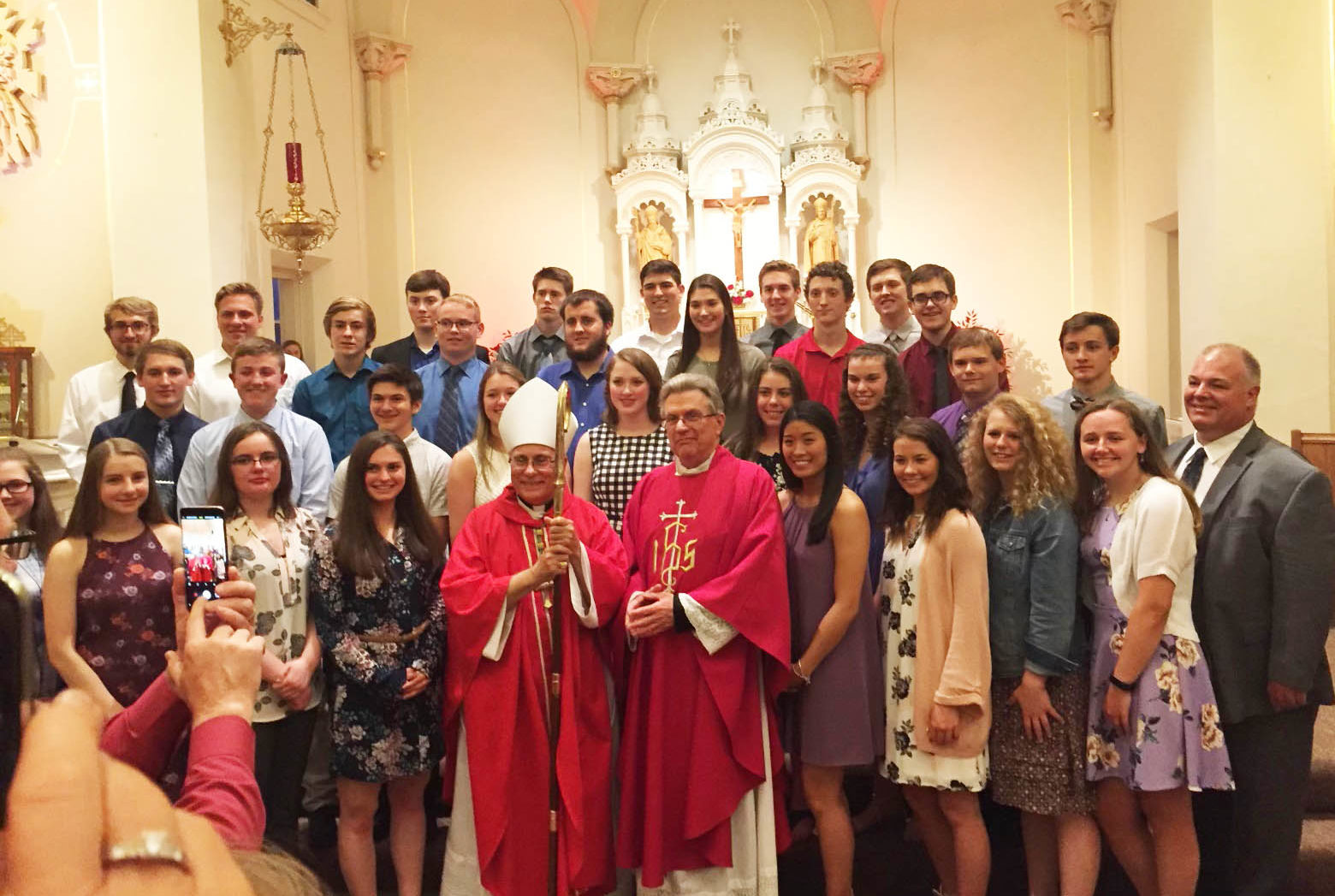
Confirmation isn’t a finish line on a young person’s journey, but rather a starting line. (Photo by Larry Hanson)
Graduations and the end of the academic year weave a sense of finality over May and June. These months also bring the Holy Spirit upon many teens through the Sacrament of Confirmation. Though Confirmation is an essential rite of passage, it is important to treat it not as a conclusion of their faith formation but as the beginning of a new chapter. It is, after all, a sacrament of initiation.
Catholic mothers express their joy at seeing their children claim the faith for themselves
Mary Cobb, a mother of 10 and parishioner at St. Mary’s Visitation, explains, “As wonderful and fun as it can be to have younger children, having adult children is a whole new level of joy. Watching our kids grow into young, capable adults has been a true blessing. Seeing them go out into the world, and take on the bumps and curves that life throws at them, places me in awe of who they have become. Knowing they have their faith life to guide them is unequaled. I can’t tell you how great it is to have your adult children surprise you by sliding into the pew to sit with you for daily Mass. I think I beam with pride every time, but then I see the tabernacle and squash my pride, and thank God for the faith he has given us.”
Amid the worldwide struggles of the past few years, Cobb was able to see her children return “home” in times of need. “Having an adult son living in a large metropolitan city, isolated due to COVID shutdowns, was very worrisome. But when he called to share the excitement of walking into a church where an announced Mass was being said, I knew he would be all right. My son knew where to turn to find comfort and stability, and that was in the Church.”
Her seventh child will be starting Confirmation classes this fall.
Jodee Tlachac, a mother of five who attends St. Dominic Parish, describes how her eldest, Brooke, has been looking forward to her Confirmation with great anticipation: “Waiting for junior year in order to be able to receive Confirmation has been hard.” She describes Brooke as an “old soul” who loves her faith and has constantly looked for ways to grow in her faith, joining in various ministries and making time for personal devotions using the Hallow app.
Planting the seeds and watering often
For Tlachac, raising her children in a way where they were constantly immersed in Catholicism has been helpful. As someone who was welcomed into the Church through RCIA at age 18 after being raised in another tradition, she felt called to live out the traditions of the Catholic faith and instill a deep understanding of why we do what we do.
As your child’s first and primary catechist, making your own faith visible to your child(ren) from an early age is essential — children model what they see. Tlachac notes, for example, that children will ask to join when she and her husband are praying the rosary. Letting their natural curiosity lead and welcoming, rather than forcing, helps with ownership and prevents power struggles.
Choosing a sponsor and a Confirmation saint
Encourage your children to choose a confirmation sponsor who can help them grow in their faith. While someone who will share “feel good” catechism and tell them what they want to hear may seem the best way to make the faith seem approachable, it may leave them ill-prepared when they come to more difficult moments in their faith lives. Someone who can, in charity, correct them when they stumble can help the roots of faith take hold.
Similarly, choosing a confirmation saint should involve careful discernment. The lives of the saints are road maps for living in holiness. Finding a saint your confirmant can turn to in prayer and for their example gives them a heavenly companion for life.
How you frame sacramental preparation matters
Though confirmandi have officially claimed the faith for themselves, we are not turning them out as sheep amidst the wolves. Conversations about faith continue with the added graces from the Holy Spirit. Parents should continue to help their children think deeply about the faith and be open to hard conversations. Tlachac notes, “It can be hard to watch your children flail, but we explain that doubting is a part of faith.” It is not the initial doubt that teens should focus on, but on finding the answers to their questions.
Cobb explains, “In our family’s case, Confirmation is not an ‘end’ to a chapter but a long-awaited day for the Gift of the Holy Spirit. It’s a pause in our children’s normal faith life, but one they know does not signal an end to a chapter. They were baptized into the Catholic faith as infants, and that is when they began their journey to heaven. We teach our children that growth in love and faith of God continues every day of their lives until they reach the end of their earthly life. “
